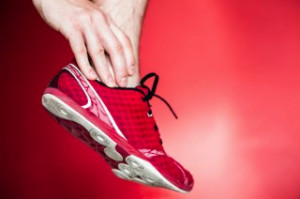Blog
The Benefits of Podiatric Medicine
 People who pursue careers in podiatric medicine share an interest in helping patients who develop many types of foot conditions. They can properly diagnose and treat uncomfortable ailments including plantar fasciitis, hammer toe, and heel spurs. This is often accomplished by performing physical examinations and X-rays. Additionally, these individuals are able to provide adequate advice on how to take care of diabetic feet, provide necessary medication, and to possibly perform surgery for the correction of deformities that involve the structure of the foot. Those individuals interested in pursuing a career as a podiatrist will earn a DPM degree, and this will typically take 4 years to complete. It may be beneficial to be proficient in developing specific skills, including being able to be detail-oriented, possess critical thinking skills, and to develop compassion. It’s advised to speak with a podiatrist to learn if this is a correct career choice for you.
People who pursue careers in podiatric medicine share an interest in helping patients who develop many types of foot conditions. They can properly diagnose and treat uncomfortable ailments including plantar fasciitis, hammer toe, and heel spurs. This is often accomplished by performing physical examinations and X-rays. Additionally, these individuals are able to provide adequate advice on how to take care of diabetic feet, provide necessary medication, and to possibly perform surgery for the correction of deformities that involve the structure of the foot. Those individuals interested in pursuing a career as a podiatrist will earn a DPM degree, and this will typically take 4 years to complete. It may be beneficial to be proficient in developing specific skills, including being able to be detail-oriented, possess critical thinking skills, and to develop compassion. It’s advised to speak with a podiatrist to learn if this is a correct career choice for you.
If you are experiencing pain in the feet or ankles, don’t join the stubborn majority refusing treatment. Feel free to contact Dr. Michael E. Newman from Pennsylvania. Our doctors can provide the care you need to keep you pain-free and on your feet.
What Is a Podiatrist?
Someone would seek the care of a podiatrist if they have suffered a foot injury or have common foot ailments such as heal spurs, bunions, arch problems, deformities, ingrown toenails, corns, foot and ankle problems, etc.
Podiatric Treatment
A podiatrist will treat the problematic areas of the feet, ankle or lower leg by prescribing the following:
- Physical therapy
- Drugs
- Orthotic inserts or soles
- Surgery on lower extremity fractures
A common podiatric procedure a podiatrist will use is a scanner or force plate which will allow the podiatrist to know the designs of orthotics. Patients are then told to follow a series of tasks to complete the treatment. The computer will scan the foot a see which areas show weight distribution and pressure points. The podiatrist will read the analysis and then determine which treatment plans are available.
If you have any questions please feel free to contact one of our offices located in Plymouth Meeting and Ambler, PA. We offer the newest diagnostic and treatment technologies for all your foot and ankle needs.
Read more about What is a Podiatrist?Possible Causes of Poor Circulation
 For people who have poor circulation, experiencing “pins and needles” and tingling are common sensations. It is not considered to be a disease, and research has shown it may be indicative of serious illnesses including heart conditions, or PAD, which is known as peripheral artery disease. When the blood circulates properly throughout the body, oxygen and essential nutrients flow easily to the organs. Poor circulation hinders the ability for this to occur. There are several symptoms that are associated with this condition, including cold feet, cramps in the muscles, lack of energy, or throbbing. History has shown that poor health habits may contribute to the onset of this ailment. These may include smoking, eating poorly, or being sedentary for long periods at a time. If you feel you have poor circulation, it’s suggested to speak with a podiatrist for possible treatment options. These may include wearing compression socks, taking prescription medicine, or surgery.
For people who have poor circulation, experiencing “pins and needles” and tingling are common sensations. It is not considered to be a disease, and research has shown it may be indicative of serious illnesses including heart conditions, or PAD, which is known as peripheral artery disease. When the blood circulates properly throughout the body, oxygen and essential nutrients flow easily to the organs. Poor circulation hinders the ability for this to occur. There are several symptoms that are associated with this condition, including cold feet, cramps in the muscles, lack of energy, or throbbing. History has shown that poor health habits may contribute to the onset of this ailment. These may include smoking, eating poorly, or being sedentary for long periods at a time. If you feel you have poor circulation, it’s suggested to speak with a podiatrist for possible treatment options. These may include wearing compression socks, taking prescription medicine, or surgery.
While poor circulation itself isn’t a condition; it is a symptom of another underlying health condition you may have. If you have any concerns with poor circulation in your feet contact one of our podiatrists of Pennsylvania. Our doctors will treat your foot and ankle needs.
Poor Circulation in the Feet
Peripheral artery disease (PAD) can potentially lead to poor circulation in the lower extremities. PAD is a condition that causes the blood vessels and arteries to narrow. In a linked condition called atherosclerosis, the arteries stiffen up due to a buildup of plaque in the arteries and blood vessels. These two conditions can cause a decrease in the amount of blood that flows to your extremities, therefore resulting in pain.
Symptoms
Some of the most common symptoms of poor circulation are:
- Numbness
- Tingling
- Throbbing or stinging pain in limbs
- Pain
- Muscle Cramps
Treatment for poor circulation often depends on the underlying condition that causes it. Methods for treatment may include insulin for diabetes, special exercise programs, surgery for varicose veins, or compression socks for swollen legs.
As always, see a podiatrist as he or she will assist in finding a regimen that suits you. A podiatrist can also prescribe you any needed medication.
If you have any questions, please feel free to contact one of our offices located in Plymouth Meeting and Ambler, PA . We offer the newest diagnostic and treatment technologies for all your foot care needs.
What Causes Tarsal Tunnel Syndrome?
 A common cause of the condition that is referred to as tarsal tunnel syndrome may occur as a result of constant overuse of the ankle. The most common reason for this to happen may be from power walking, frequent running, or standing for the majority of the day. It typically affects the nerve that is on the inside of the foot and ankle, and when this becomes damaged, inflammation and tenderness may occur. Research has shown the importance of treating tarsal tunnel syndrome promptly to avoid the possibility of permanent nerve damage from developing. Treatment options may begin with resting and elevating the foot, which may reduce inflammation, in addition to taking anti-inflammatory medications, which may help in alleviating a portion of the pain that often accompanies this condition. If you feel you may have tarsal tunnel syndrome, please speak to a podiatrist as quickly as possible for a proper evaluation and to discuss the best treatments techniques for you.
A common cause of the condition that is referred to as tarsal tunnel syndrome may occur as a result of constant overuse of the ankle. The most common reason for this to happen may be from power walking, frequent running, or standing for the majority of the day. It typically affects the nerve that is on the inside of the foot and ankle, and when this becomes damaged, inflammation and tenderness may occur. Research has shown the importance of treating tarsal tunnel syndrome promptly to avoid the possibility of permanent nerve damage from developing. Treatment options may begin with resting and elevating the foot, which may reduce inflammation, in addition to taking anti-inflammatory medications, which may help in alleviating a portion of the pain that often accompanies this condition. If you feel you may have tarsal tunnel syndrome, please speak to a podiatrist as quickly as possible for a proper evaluation and to discuss the best treatments techniques for you.
Tarsal tunnel syndrome can be very uncomfortable to live with. If you are experiencing tarsal tunnel syndrome, contact one of our podiatrists of Pennsylvania. Our doctors can provide the care you need to keep you pain-free and on your feet.
Tarsal Tunnel Syndrome
Tarsal tunnel syndrome, which can also be called tibial nerve dysfunction, is an uncommon condition of misfiring peripheral nerves in the foot. The tibial nerve is the peripheral nerve in the leg responsible for sensation and movement of the foot and calf muscles. In tarsal tunnel syndrome, the tibial nerve is damaged, causing problems with movement and feeling in the foot of the affected leg.
Common Cause of Tarsal Tunnel Syndrome
- Involves pressure or an injury, direct pressure on the tibial nerve for an extended period of time, sometimes caused by other body structures close by or near the knee.
- Diseases that damage nerves, including diabetes, may cause tarsal tunnel syndrome.
- At times, tarsal tunnel syndrome can appear without an obvious cause in some cases.
The Effects of Tarsal Tunnel Syndrome
- Different sensations, an afflicted person may experience pain, tingling, burning or other unusual sensations in the foot of the affected leg.
- The foot muscles, toes and ankle become weaker, and curling your toes or flexing your foot can become difficult.
- If condition worsens, infections and ulcers may develop on the foot that is experiencing the syndrome.
A physical exam of the leg can help identify the presence of tarsal tunnel syndrome. Medical tests, such as a nerve biopsy, are also used to diagnose the condition. Patients may receive physical therapy and prescriptive medication. In extreme cases, some may require surgery.
If you have any questions please feel free to contact one of our offices located in Plymouth Meeting and Ambler, PA . We offer the newest diagnostic and treatment technologies for all your foot and ankle needs.
It’s Important to Stretch Your Feet While Working
 There are many professions where it is necessary to stand for the majority of the day. People who are employed as nurses may be standing and walking, while performing the necessary functions to take proper care of their patients. Research has shown the importance of stretching the feet, which may promote improved circulation. When the shoes are changed frequently or the correct insoles are worn, the feet will feel more comfortable. Practicing yoga has been known to stretch the muscles, toes, and tendons in the feet. This may also develop additional flexibility. If you are in a profession where you are walking most of the day, please speak to a podiatrist about proper stretching techniques, which may prevent painful foot conditions from developing.
There are many professions where it is necessary to stand for the majority of the day. People who are employed as nurses may be standing and walking, while performing the necessary functions to take proper care of their patients. Research has shown the importance of stretching the feet, which may promote improved circulation. When the shoes are changed frequently or the correct insoles are worn, the feet will feel more comfortable. Practicing yoga has been known to stretch the muscles, toes, and tendons in the feet. This may also develop additional flexibility. If you are in a profession where you are walking most of the day, please speak to a podiatrist about proper stretching techniques, which may prevent painful foot conditions from developing.
While working on the feet, it is important to take the proper care of them. For more information about working on your feet, contact one of our podiatrists from Pennsylvania. Our doctors will treat your foot and ankle needs.
Working on Your Feet
Standing on your feet for long periods of time can cause stress and pain in your feet. Your whole body may experience change in terms of posture, back pain, bunions, callouses and or plantar warts. There are ways to avoid these conditions with proper foot care, smart choices and correct posture.
Positive Changes
Negative heeled shoe – Choosing this shoe type places the heel slightly lower than the ball of the foot. These are great for overall foot health. Find shoes that fit you correctly.
Go barefoot – Our feet were not designed to be enclosed for all hours of the day. Try to periodically expose your feet to air.
Eliminate Pain
Foot Exercises – Performing simple exercises, incorporating yoga and doing stretches are beneficial. This will allow increased blood flow to the area and muscles of the foot.
Achilles tendon – Stretching the foot out flat on the floor will relax the calf muscles and tendon. These exercises can be performed almost anywhere. Make sure you add these exercises to your daily regimen.
With a little bit of this information and knowing more about foot health, you will notice changes. Foot stretches and proper footwear will help with pain and prevent further issues.
If you have any questions please feel free to contact one of our offices located in Plymouth Meeting and Ambler, PA . We offer the newest diagnostic and treatment technologies for all your foot and ankle needs.
